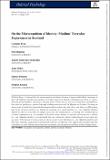Files in this item
On the misrecognition of identity : Muslims’ everyday experiences in Scotland
Item metadata
| dc.contributor.author | Ryan, Caoimhe | |
| dc.contributor.author | Hopkins, Nick | |
| dc.contributor.author | Ahluwalia-McMeddes, Amrita | |
| dc.contributor.author | Dobai, Anna | |
| dc.contributor.author | Pehrson, Samuel | |
| dc.contributor.author | Reicher, Stephen | |
| dc.date.accessioned | 2023-02-02T12:30:09Z | |
| dc.date.available | 2023-02-02T12:30:09Z | |
| dc.date.issued | 2023-08-01 | |
| dc.identifier | 282893915 | |
| dc.identifier | cc69fa80-583b-466d-94bc-3788f20cd20a | |
| dc.identifier | 85147447049 | |
| dc.identifier | 000921801000001 | |
| dc.identifier.citation | Ryan , C , Hopkins , N , Ahluwalia-McMeddes , A , Dobai , A , Pehrson , S & Reicher , S 2023 , ' On the misrecognition of identity : Muslims’ everyday experiences in Scotland ' , Political Psychology , vol. 44 , no. 4 , pp. 769-787 . https://doi.org/10.1111/pops.12885 | en |
| dc.identifier.issn | 0162-895X | |
| dc.identifier.other | ORCID: /0000-0002-9259-6408/work/128097774 | |
| dc.identifier.uri | https://hdl.handle.net/10023/26887 | |
| dc.description | Funding: This research was made possible by a grant (“Misrecognising Minorities in Europe”) from the Volkswagen Foundation, Germany. | en |
| dc.description.abstract | Political theory is interested in the misrecognition of identity because it impacts individuals’ autonomy in their self-definition and thus their ability to articulate and pursue identity-related interests. Here, we explore minority group members’ experiences of being seen in terms that do not accord with their self-definition. Our data are qualitative, gathered through walking interviews with 24 Muslims in Scotland. Focusing on interactions in which they reported discrepancies between how they and others saw them, we differentiate four forms of misrecognition: i. Having the meaning of a valued identity (i.e., one’s Muslim identity) defined by others in ways that one judges inaccurate and inappropriate; ii. Having one’s membership of a valued community (e.g. as a member of Scottish society) denied or rejected; iii. Having one’s identity (i.e., one’s Muslim identity) overlooked such that one’s distinctive identity-related needs are not taken into account; iv. Being seen in terms of just one of one’s many social identities (i.e., one’s Muslim identity) such that other identities (judged more situationally relevant) are ignored. This empirically-grounded typology contributes to wider debates about the forms of identity (mis)recognition and their political implications. | |
| dc.format.extent | 19 | |
| dc.format.extent | 155215 | |
| dc.language.iso | eng | |
| dc.relation.ispartof | Political Psychology | en |
| dc.subject | Recognition | en |
| dc.subject | Misrecognition | en |
| dc.subject | Identity | en |
| dc.subject | Identity enactment | en |
| dc.subject | Muslims | en |
| dc.subject | BF Psychology | en |
| dc.subject | NDAS | en |
| dc.subject | AC | en |
| dc.subject | MCC | en |
| dc.subject.lcc | BF | en |
| dc.title | On the misrecognition of identity : Muslims’ everyday experiences in Scotland | en |
| dc.type | Journal article | en |
| dc.contributor.institution | University of St Andrews. School of Psychology and Neuroscience | en |
| dc.identifier.doi | https://doi.org/10.1111/pops.12885 | |
| dc.description.status | Peer reviewed | en |
This item appears in the following Collection(s)
Items in the St Andrews Research Repository are protected by copyright, with all rights reserved, unless otherwise indicated.

